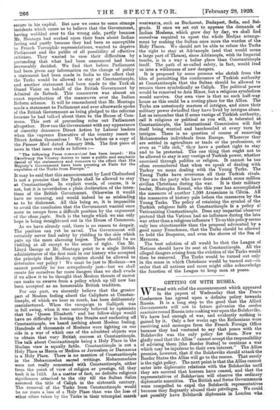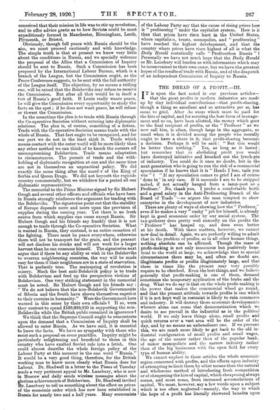GETTING ON WITH RUSSIA.
WE read with relief the announcement which appeared in the papers of Wednesday that the Peace Conference has agreed upon a definite policy towards Russia. It is a long step to the good that the Allied Governments will not in future galvanize the cordon sanitaire round Russia into making war upon the Bolsheviks. We have had enough of war, and evidently nothing is gained by it. Only a few weeks ago the Esthonians were receiving acid. messages from the French Foreign Office because they had ventured to say that peace with the Bolsheviks was the only policy for them. Now we gladly read that the Allies " cannot accept the responsibility of advising them [the Border States] to continue a war which may be injurious to their own interest." The Allies promise, however, that if the Bolsheviks should attack the Border States the Allies will go to the rescue. That surely is the right policy. The next point is that the Allies cannot enter into diplomatic relations with the Bolsheviks until they are assured that horrors have ceased, and that the representatives of Bolshevism will observe the ordinary diplomatic amenities. The British and Swiss Government') were compelled to expel the Bolshevik representatives because they flagrantly abused their privileges. We could . not possibly have Bolshevik diplomats in London who. conceived that their mission in life was to stir up revolution, and to offer advice gratis as to how Soviets could be most expeditiously formed in Manchester, Birmingham, Leeds, Plymouth, or Bristol. Obviously, though full peace with Russia should be the aim, we must proceed cautiously and with knowledge.
The simple truth is that at present we know very little about the conditions in Russia, and we specially welcome the proposal of the Allies that a Commission of Inquiry should be sent to Russia. Such a Commission has been proposed by the International Labour Bureau, which is a branch of the League, but the Commission ought, as the Peace Conference suggests, to be sent with the full authority of the League itself. The objection, by no means a trifling one, will be raised that the Bolsheviks may refuse to receive the Commission. But after all that would be in itself a test of Russia's good faith. If Lenin really wants peace, he will give the Commission every opportunity to study the facts on the spot ; if he does not want peace, he will refuse or thwart the Commission.
In the meantime the plan is to trade with Russia through the Co-operative Societies without entering into diplomatic relations. The plan is, of course, something of a fiction. Trade with the Co-operative Societies means trade with the whole of Russia. That fact ought to be recognized, and for our part we do not in the least shirk it. Trade which means contact with the outer world will be more likely than any other method we can think of to knock the corners off uncompromising Bolshevism. Trade means adaptation to circumstances. The pursuit of trade and the with- holding of diplomatic recognition at one and the same time are not in themselves an unpractical policy. We did exactly the same thing after the murder of the King of Serbia and Queen Draga. We did not boycott the regicide country commercially, but we withdrew for a period all our diplomatic representatives. The memorial to the Prime Minister signed by Sir Hubert Gough and several other officers and officials who have been in Russia strongly reinforces the argument for trading with the Bolsheviks. The signatories point out that the stability of Europe depends more and more upon the- provision of supplies during the coming year. Yet there is no fresh source from which supplies can come except Russia. Sir Hubert Gough and his friends say frankly that it is not enough to trade through the Co-operative Societies. What is wanted in Russia, they contend, is an entire cessation of the fighting. There must be peace everywhere, otherwise there will not be transport for the grain, and the peasant will not disclose his stocks and will not work for a larger harvest than he can consume himself. The signatories next argue that if there be any ability or wish in the Bolsheviks to overrun neighbouring countries, the way will be made easy for them if their neighbours are in a state of starvation. That is perfectly true. The mainspring of revolution is misery. Much the best anti-Bolshevik policy is to trade with Bolshevism and feed up the prospective victims of Bolshevism. One very striking statement in the memorial must be noted. Sir Hubert Gough and his friends say : " We do not believe that the non-Bolshevik Governments of Siberia and the South have shown themselves superior to their enemies in humanity " Were the Government here warned in this sense by their own officials ? If so, were they content to spend £100,000,000 in supporting the non- Bolsheviks while the British public remained in ignorance We think that the Supreme Council ought to concentrate upon the demand that a Commission of Inquiry shall be allowed to enter Russia. As we have said, it is essential to know the facts. We have no sympathy with those who resist such a proposal on some punctilio. Inquiry might be particularly enlightening and beneficial to those in this country who have exalted Soviet rule into a fetish. One could almost describe the whole foreign policy of the Labour Party at this moment in the one word Russia."
It would be a very good thing, therefore, for the British working man to know more clearly what Russia does for Labour. Dr. Shadwell in a letter to the Times of Tuesday made a very pertinent appeal to Mr. Lansbury, who is now in Moscow and daily sends wireless messages about the glorious achievements of Bolshevism. Dr. Shadwell invited .Mr. Lansbury to tell us something about the effect on prices of the economic order which has now been established in Russia for nearly two and a half years. Many economists of the Labour Party say that the cause of rising prices here is " profiteering " under the capitalist system. How is it then that prices have risen least in the United States, where capitalism, trusts, monopolies, and " profiteering " have reached the highest development, and that the country where prices have risen highest of all is what the Daily Herald ecstatically calls " Profiteerless Russia " Personally we have not much hope that the Daily Herald or Mr. Lansbury will burden us with information which may be inconvenient to their own cause, but we have the greatest hopes of the results of trade with Russia, and of the despatch of an independent Commission of Inquiry to Russia.



































 Previous page
Previous page